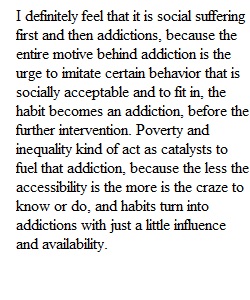


Q Our lecture, readings and videos from this week challenge us to think about the roles that poverty, inequality and other forms of social suffering play in the production of illness and especially in addiction. Singer argues that we often think about addiction as leading to social suffering rather than thinking about social suffering leading to addiction—that is, he argues that we tend to get our causation backwards. What do you think about this? How should we approach addiction as a society? Rehabilitation? Incarceration? Prevention? Is there a way to focus on systems-level?
View Related Questions